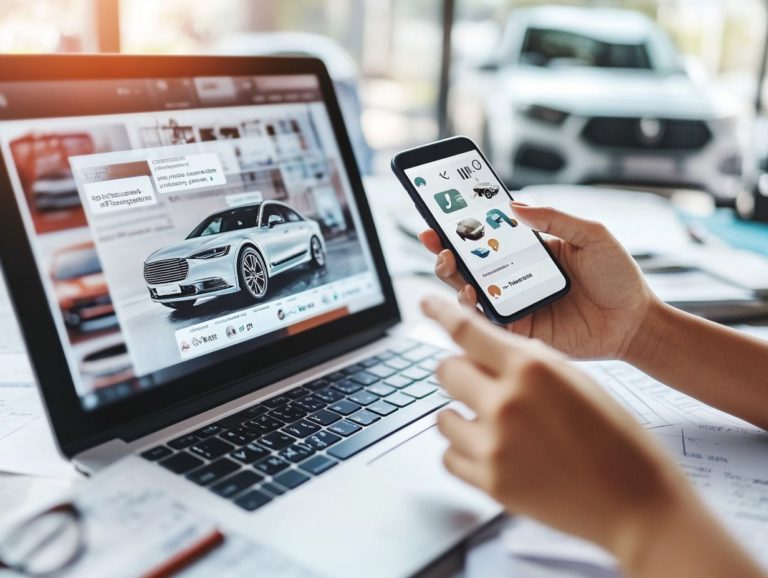5 Reasons to Buy a New Car Instead of a Used Car
When faced with the choice between a new or used car, the decision can feel daunting. While used cars may initially appear to be the more budget-friendly option, there are compelling reasons to seriously consider investing in a new vehicle.
From enhanced reliability and the latest safety features to improved fuel efficiency and the allure of customization options, opting for new can provide substantial benefits.
Let s explore five exciting reasons why a new car could be your best choice, guiding you toward a more informed decision for your next vehicle.
Contents
- Key Takeaways:
- 1. Higher Reliability and Dependability
- 2. Better Fuel Efficiency and Lower Emissions
- 3. More Advanced Safety Features
- 4. Customization Options
- 5. Warranty Coverage and Peace of Mind
- Is Buying a New Car Worth the Extra Cost?
- Frequently Asked Questions
- 1. Why should you buy a new car instead of a used one?
- 2. Is a new car more reliable than a used car?
- 3. How does financing for a new car differ from financing for a used car?
- 4. Are new cars equipped with better technology and safety features?
- 5. Can I customize a new car to my preferences?
- 6. Is buying a new car a better long-term investment compared to a used car?
Key Takeaways:

Experience unmatched reliability with a new car your peace of mind on the road.
New cars are more environmentally friendly and cost-effective in the long run, thanks to better fuel efficiency and lower emissions.
Stay safe with advanced safety features, providing an extra layer of protection for drivers and passengers.
1. Higher Reliability and Dependability
When you re in the market for a new car, reliability and dependability become your guiding stars. These qualities enhance your buying experience and safeguard the long-term value of your investment.
Reliability is crucial for both your initial purchase and the ongoing costs of ownership. Brands like Toyota and Honda consistently shine in reliability surveys, meaning you can expect lower maintenance expenses as time rolls on.
According to Bankrate, a reliable vehicle could save you as much as $1,400 in repair costs over a decade. For those considering used cars, it s essential to check maintenance records and vehicle history, as these insights reveal how well a car has been cared for and its potential for enduring performance.
Cars with good service records usually keep their value longer, making it clear that your choices regarding reliability are pivotal not just for immediate enjoyment but also for your financial well-being in the future.
2. Better Fuel Efficiency and Lower Emissions
In the automotive market, newer vehicles often shine with better fuel efficiency and lower emissions. This makes them particularly appealing to environmentally conscious buyers and anyone looking to cut down on fuel expenses.
These improvements arise from a range of innovative technologies, such as engines designed for better power and efficiency, hybrid powertrains, and enhanced aerodynamics all meticulously engineered to optimize fuel economy while reducing harmful emissions.
Recent studies suggest that when you opt for a new vehicle, you can expect a noticeable reduction in your carbon footprint compared to older models, which frequently struggle to keep pace with today s environmental standards.
The financial benefits are hard to ignore; you ll typically save a significant amount on fuel costs over time, as fuel-efficient vehicles generally outperform their older counterparts. With fuel prices on the rise, a long-term cost analysis clearly favors investing in newer cars, showcasing their dual advantages of saving money and fostering a greener planet.
3. More Advanced Safety Features
You increasingly prioritize advanced safety features when considering a vehicle purchase. New cars often come with the latest technology aimed at enhancing both driver and passenger safety, potentially leading to lower insurance costs over time.
Consider features like automatic emergency braking, which can significantly reduce the likelihood of collisions by detecting imminent obstacles and applying the brakes autonomously. Lane departure warning systems further bolster your safety, alerting you when you drift out of your designated lane, thus helping to prevent accidents often caused by distracted driving.
Adaptive cruise control enhances your driving experience by automatically adjusting speed according to traffic conditions, making long journeys less taxing while ensuring you maintain a safe distance from other vehicles.
These innovations not only provide you with peace of mind but can also contribute to lower premiums, as insurers frequently reward vehicles equipped with such sophisticated safety measures.
4. Customization Options
Ready to make your car truly yours? The customization options available when buying a new vehicle are incredible!
One of the most appealing aspects of buying a new car is the abundant customization options at your fingertips. You can tailor your vehicle to match your unique preferences and elevate your overall driving experience.
From choosing vibrant paint colors and stylish interior upholstery to integrating the latest infotainment systems and advanced safety features, the array of upgrades that make your car look good and work better is truly impressive.
You can also consider performance upgrades, like sport-tuned suspensions or enhanced engine options, which can significantly elevate your driving dynamics.
On the flip side, when you explore used cars, your customization possibilities are often limited to the choices made by the previous owner. This may not resonate with your personal taste or meet modern tech standards.
So, while used cars can certainly offer value, the flexibility and personalized experience found in new vehicles usually steal the spotlight. This appeal is particularly strong for those who seek both style and substance.
5. Warranty Coverage and Peace of Mind
One of the significant advantages of purchasing a new car lies in the comprehensive warranty coverage it usually provides. This grants you peace of mind against unexpected ownership costs over the lifespan of your vehicle.
These warranties typically cover a range of essential components, including:
- Engine
- Transmission
- Electrical systems
Often, these warranties extend for three to five years or up to a specific mileage limit.
On the flip side, the warranty options for used cars can vary widely depending on age, mileage, and previous ownership. Many used vehicles may still qualify for limited warranties, which often cover crucial areas for shorter periods.
Grasping the nuances of these different warranty types can greatly impact the long-term value of your car, enhancing your overall buying experience. A robust warranty can also serve as a compelling selling point, instilling confidence in any prospective buyers you might encounter down the road.
Is Buying a New Car Worth the Extra Cost?
When you re contemplating whether purchasing a new car justifies the additional cost, it s vital to assess a variety of factors. This includes not only the purchase price but also the ongoing ownership expenses and the long-term advantages that new vehicles often offer compared to used ones.
You must consider the initial financial outlay and how this decision may impact your expenses in the long run. For example, new cars typically come with warranties that can dramatically lower repair costs.
Older models might demand more frequent trips to the mechanic leading to those pesky spikes in maintenance expenses.
New cars often have better fuel efficiency and cutting-edge safety technologies. These features can translate into reduced insurance premiums and better resale values in the future.
Ultimately, you need to weigh these potential long-term benefits against the immediate savings associated with used vehicles. This allows you to make a well-informed choice that aligns with your financial situation.
What Are the Benefits of Buying a Used Car?
Purchasing a used car presents a wealth of benefits, including lower depreciation rates and more budget-friendly prices. This makes it an attractive option for those who are mindful of their finances and in search of dependable vehicles.
Beyond the immediate financial advantages, buying a pre-owned vehicle often leads to reduced insurance costs. This is because premiums typically correlate with the car’s value.
For instance, choosing a used Honda Civic not only grants you impressive fuel efficiency but also results in lower insurance rates compared to its new counterpart.
Opting for a used car allows you to access vehicle history reports, providing clarity about a car’s past. This transparency is especially beneficial when you’re considering well-regarded models like the Toyota Camry, celebrated for its reliability and solid performance history.
These factors collectively make purchasing a used car a smart and economical choice for discerning consumers.
How Can One Negotiate a Good Deal on a New Car?

Negotiating a favorable deal on a new car requires careful preparation. It also involves understanding dealership tactics and different ways to pay for your car.
Understanding the various financing options can significantly impact the final price. Lenders typically present different rates and terms, so researching these options in advance helps you estimate your monthly payments. You can also uncover any dealership incentives that could lower the overall cost.
Staying aware of current auto loan rates is crucial. Even a minor variation can translate into substantial savings over the life of your loan. Knowing about competing dealerships helps you negotiate better, enhancing your position at the bargaining table.
What Are the Long-Term Savings of Buying a New Car?
Buying a new car can save you a lot of money in the long run! However, if you’re considering a used vehicle, there are also 5 ways to save money on a used car purchase that can help you maximize your investment. Factors like improved fuel efficiency, lower maintenance costs, and a higher resale value compared to used vehicles contribute to these savings.
These advantages arise from advancements in technology and engineering that enable newer models to operate more efficiently. As fuel prices fluctuate, the savings from a vehicle’s efficiency become increasingly evident, allowing you to spend less at the pump.
In the early years, maintenance costs for new vehicles are usually lower, leading to fewer visits to the mechanic. Additionally, a newer vehicle’s resale value tends to be higher. This means that when it s time to sell or trade-in, you can enjoy a notably better financial return.
All of these factors strengthen the case for purchasing new cars, ultimately enhancing your financial well-being, especially when considering financing options.
What Are the Factors to Consider When Deciding Between a New or Used Car?
Deciding between a new or used car involves several important factors. Consider your budget, how you plan to use the vehicle, and your personal preferences, as these elements greatly influence your purchasing decision.
Analyzing the total cost is crucial. New vehicles often have a higher price tag and may depreciate faster than used ones. It’s important to know about warranties new cars typically offer comprehensive manufacturer warranties, giving you peace of mind.
You should also take resale value into account. While new cars lose value quickly, some used models hold their worth better over time.
Ultimately, your choice should reflect your individual needs and lifestyle, ensuring that the vehicle you select aligns with your daily routines and financial comfort.
What Are the Common Myths About Buying a New Car?
Several common myths surround the process of buying a new car, often leading to uninformed decisions about purchase price, financing options, and overall ownership costs.
You might think that the sticker price is set in stone. However, most dealerships actually expect a bit of haggling. Misunderstandings about financing can also lead you to overlook better terms available elsewhere; remember, not every dealer offers the best rates.
It s a frequent mistake to assume that new vehicles will always experience high depreciation right off the lot, which can discourage you from exploring the market. By clarifying these misconceptions and emphasizing the importance of thorough research, you can equip yourself with the knowledge necessary to navigate this significant investment wisely.
Frequently Asked Questions

1. Why should you buy a new car instead of a used one?
There are several advantages to buying a new car instead of a used one. Some of the main reasons include reliability, warranty coverage, better financing options, up-to-date technology and safety features, and the ability to customize and personalize your vehicle.
Start your car buying journey today!
2. Is a new car more reliable than a used car?
In most cases, yes. A new car is typically more reliable because it hasn’t been driven before.
It hasn’t suffered from wear and tear, so it’s less likely to have car problems. New cars often come with warranties, giving you peace of mind and protection against unexpected repairs.
3. How does financing for a new car differ from financing for a used car?
Financing for new cars is usually better than for used cars. New cars have a higher resale value, making them less risky for lenders.
This means you might secure a lower interest rate and enjoy lower monthly payments when buying a new car.
4. Are new cars equipped with better technology and safety features?
Yes, new cars come with the latest technology and safety features. These include advanced driver assistance systems and smartphone integration.
Such features enhance your driving experience and improve safety for you and your passengers.
5. Can I customize a new car to my preferences?
Absolutely! Many new models offer a variety of customization options, from paint colors to performance upgrades.
This allows you to create a unique driving experience tailored just for you.
6. Is buying a new car a better long-term investment compared to a used car?
While new cars cost more upfront, they can be a better long-term investment. They generally last longer and need less maintenance, saving you money over time.
A well-maintained new car may also have a higher resale value when you’re ready to sell or trade it in.






